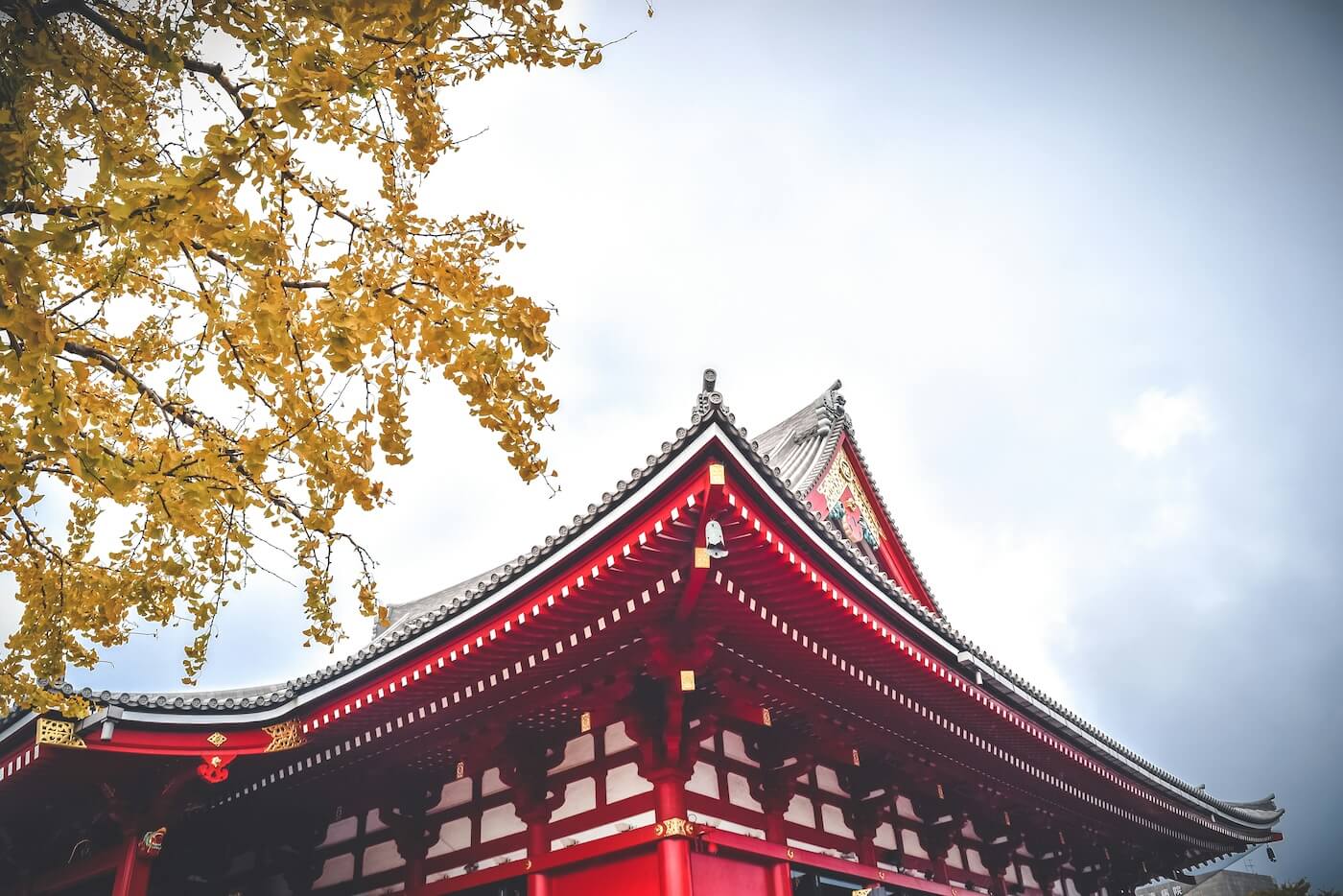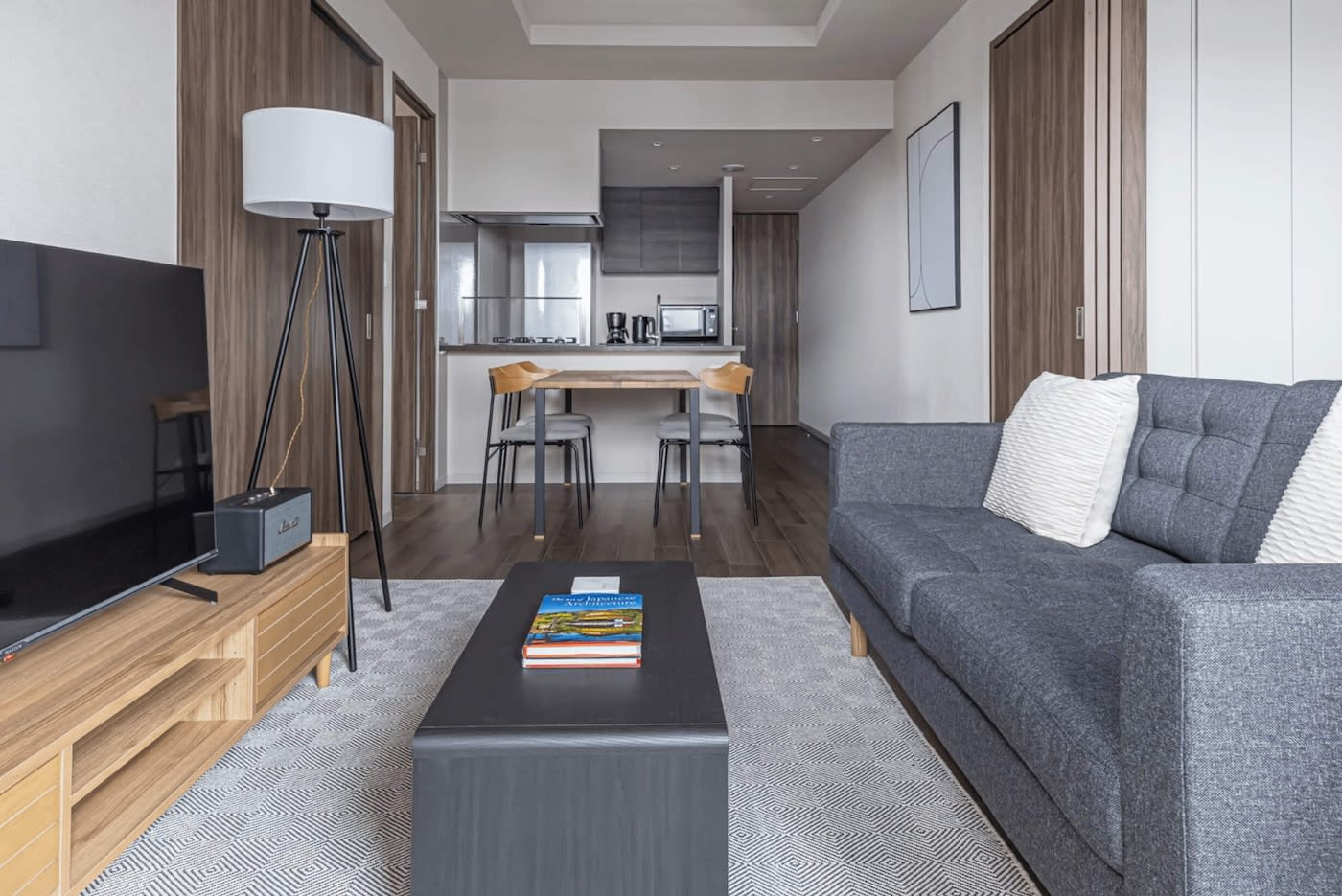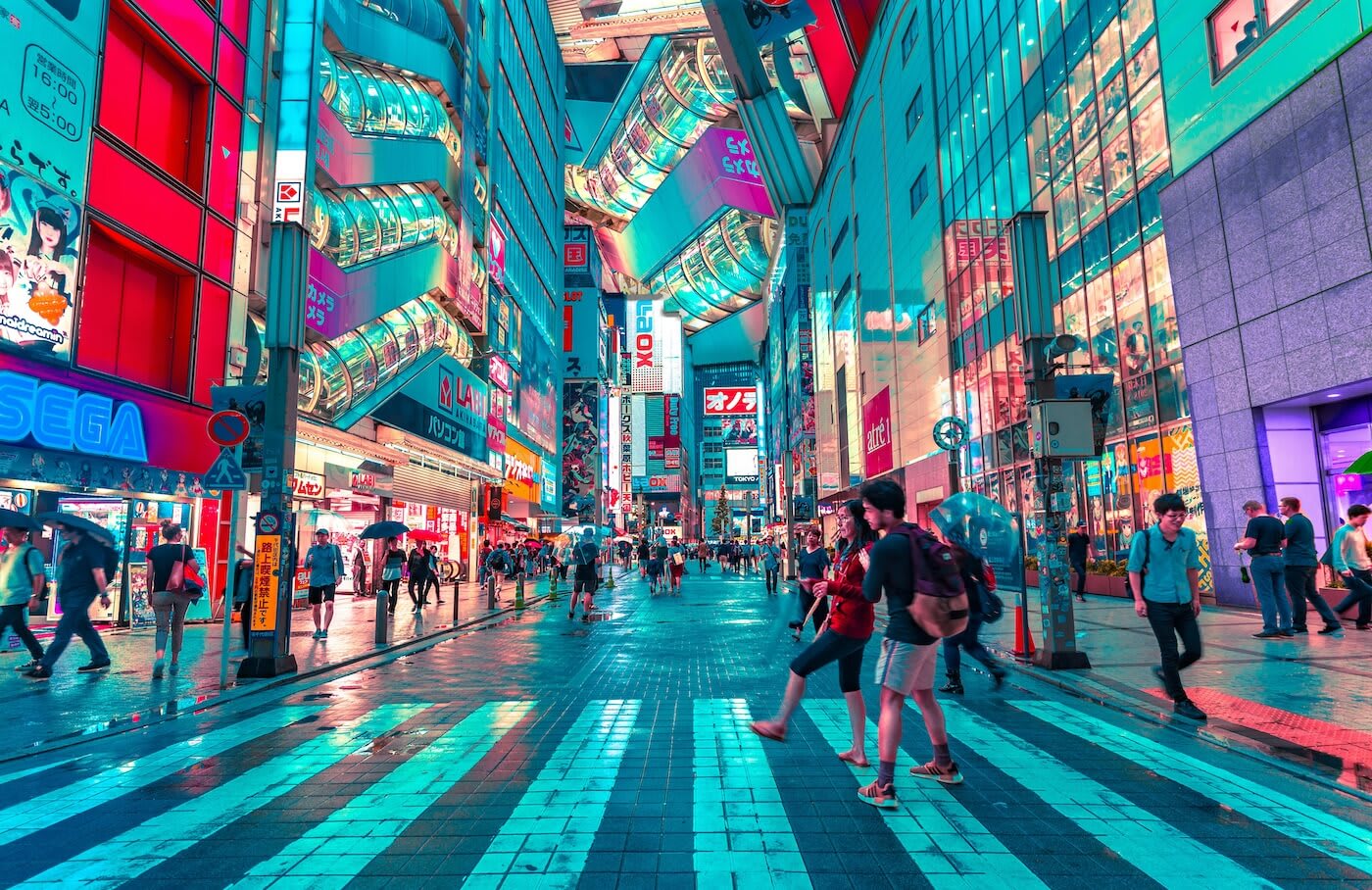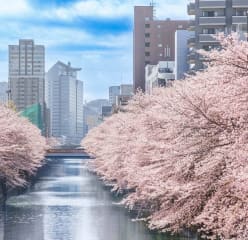Renting in Tokyo: A guide on how to find the perfect apartment
What steps should you take before moving to Japan?

Tokyo, the bustling capital of Japan, is a city where modernity meets tradition. Finding an apartment here can be both exhilarating and challenging. With its dynamic neighborhoods and diverse living options, Tokyo offers something for everyone – young professionals, families, and expatriates. This comprehensive guide will take you through everything you need to know about renting an apartment in Tokyo, from understanding the market to signing the lease.
With a range of apartment sizes and flexible lease terms, Blueground provides a hassle-free renting experience in Tokyo. Each home boasts fast Wi-Fi, premium linens, smart home entertainment, and, reliable support. So you’ll feel at home and free to roam Tokyo for as long as you want.
Understanding the Tokyo Rental Market
The Unique Landscape of Tokyo Real Estate
Tokyo’s real estate market is unique due to its high density, the diversity of its neighborhoods, and its cultural norms. Here’s a deeper look into why Tokyo’s rental market stands out:
- High Demand & Limited Space: Tokyo is one of the most densely populated cities in the world. This high demand, coupled with limited space, especially in central areas, drives up rental prices. The competition can be fierce, so understanding the market is crucial.
- Variety of Neighborhoods: Tokyo is divided into 23 special wards, each with its own character. From the bustling shopping streets of Shibuya to the serene, residential neighborhoods of Setagaya, each area offers different living experiences.
- Cultural Norms: The Japanese rental market operates differently from other countries. Practices such as key money, the role of a guarantor, and the emphasis on meticulous cleanliness and respect for neighbors are part of the cultural landscape.
Types of Apartments
In Tokyo, apartments generally fall into two categories:
- Apato (アパート): These are usually older, wooden structures with fewer amenities. They are often less expensive but may lack the modern conveniences found in newer buildings.
- Mansion (マンション): Modern, reinforced concrete buildings that often come with better security, more amenities, and higher quality finishes. They are generally more expensive but provide a more comfortable living environment.
Cost of Renting
The cost of renting an apartment in Tokyo varies significantly based on location, size, and type. Here’s a detailed breakdown:
- Studio Apartments (1R/1K): ¥50,000 – ¥100,000 per month. These are typically small and suited for individuals or couples who do not need much space.
- One-Bedroom Apartments (1LDK): ¥80,000 – ¥200,000 per month. These are ideal for single professionals or couples who need a bit more space.
- Two-Bedroom Apartments (2LDK): ¥150,000 – ¥300,000 per month. Suitable for small families or those needing more room.
- Luxury Apartments: High-end apartments in central locations can exceed ¥500,000 per month.

Initial Costs to Consider
When renting an apartment in Tokyo, initial costs can be substantial. Be prepared for the following:
- Key Money (礼金): A non-refundable gratuity to the landlord, typically equivalent to 1-2 months’ rent. It’s a traditional practice and is often considered a gesture of goodwill.
- Security Deposit (敷金): Usually equivalent to 1-2 months’ rent, this deposit is refundable upon vacating the apartment, provided there are no damages or excessive wear and tear.
- Agency Fee (仲介手数料): This is generally around one month’s rent and is paid to the real estate agent for their services.
- First Month’s Rent: Paid upfront as part of the initial agreement.
- Insurance: Tenant insurance, often required, covers damage and liability. The cost can vary depending on the provider and coverage.
Ongoing Costs
In addition to rent, there are several ongoing costs associated with renting an apartment in Tokyo:
- Maintenance Fees (管理費 or 共益費): These are monthly charges for the upkeep of common areas in the building, such as lobbies and elevators. They typically range from ¥5,000 to ¥20,000 per month.
- Utilities: Monthly costs for electricity, gas, water, and internet. Utilities can add ¥10,000 – ¥30,000 to your monthly expenses, depending on usage.
- Parking: If you have a car, parking fees can be quite high, often ranging from ¥20,000 to ¥50,000 per month in central areas.
Steps to Finding the Perfect Apartment
Step 1: Setting Your Budget
Before you start searching, it’s important to establish a realistic budget. Consider the following:
- Monthly Rent: Typically, your rent should not exceed 30% of your monthly income to maintain financial stability.
- Initial Costs: Include key money, security deposit, agency fee, and the first month’s rent in your budget planning.
- Ongoing Costs: Account for maintenance fees, utilities, and any additional costs like parking.
Step 2: Deciding on a Location
Tokyo’s diverse neighborhoods offer a range of living experiences. Here’s a closer look at some popular areas:
- Shibuya: Known for its vibrant youth culture, shopping, and nightlife. Shibuya is ideal for those who enjoy a bustling urban environment but can be expensive.
- Shinjuku: A major business and entertainment district. Shinjuku offers excellent transport links and a wide range of amenities but can be noisy and crowded.
- Minato: A high-end area popular with expatriates and home to many embassies. It offers a quieter atmosphere and better amenities but comes with a higher price tag.
- Setagaya: A quieter, residential area that is popular with families. It offers more space and a suburban feel, making it suitable for those who prefer a more relaxed lifestyle.
- Tama Area: Located further from central Tokyo, this area offers more space at a lower cost but requires longer commutes to the city center.
Step 3: Understanding Japanese Rental Terms
Familiarize yourself with common Japanese rental terms to make the process smoother:
- 1R (ワンルーム): A single room that serves as both living and sleeping space.
- 1K/1DK/1LDK: Apartments with one room plus a kitchen (1K) or dining/living area (1DK/1LDK).
- 2DK/2LDK: Two rooms plus a dining/living area and kitchen.
Step 4: Searching for Apartments
Finding the right apartment involves several strategies:
- Real Estate Agencies: Utilize agencies such as Suumo, Homes, and Real Estate Japan. These agencies provide extensive listings and can help with the search process.
- Online Listings: Websites like GaijinPot, Craigslist, and Tokyo Craigslist cater specifically to foreigners and offer a wide range of rental options.
- Networking: Ask friends, and colleagues, or join local expat groups. Word-of-mouth recommendations can sometimes lead to hidden opportunities.
- Visit Multiple Properties: Don’t settle for the first apartment you see. Visit multiple properties to compare and find the best fit.

Step 5: Viewing Apartments
When viewing apartments, consider the following aspects:
- Building Condition: Check the general upkeep of the building. Look for signs of wear and tear or maintenance issues.
- Natural Light and Ventilation: Ensure the apartment has adequate windows and airflow. A well-lit and ventilated apartment can greatly affect your living experience.
- Noise Levels: Evaluate the noise levels in and around the apartment. Check for soundproofing, especially in central areas where noise can be a concern.
- Neighborhood: Explore the surrounding area. Assess safety, cleanliness, availability of amenities, and overall vibe.
Step 6: Application Process
If you find an apartment you like, follow these steps for the application:
- Application Form: Complete the application form provided by the real estate agency. Be prepared to provide detailed information about your employment and financial status.
- Guarantor: A Japanese guarantor is often required. If you don’t have one, consider using a guarantor company, which charges a fee but provides the necessary assurance to the landlord.
- Documentation: Prepare documents needed for moving to Japan such as your passport, visa, proof of income, and sometimes a letter from your employer.
Step 7: Signing the Lease
Once approved, you’ll sign a lease agreement (賃貸契約書). Key points to review:
- Lease Term: Typically 1-2 years, with an option to renew. Confirm the duration and any conditions for renewal.
- Rent Increases: Understand the conditions under which rent can be increased. Check if there are any scheduled increases during the lease term.
- Maintenance Fees: Review the details of monthly maintenance fees and what they cover.
- Cancellation Policy: Understand the terms for early termination of the lease, including the notice period and any penalties.
Moving In & Settling Down
Preparing for the Move
Get set for your move by addressing the following:
- Utilities: Arrange for utilities such as electricity, gas, water, and internet. Many utility providers have online services for setting up or transferring accounts.
- Furniture: Most apartments in Tokyo are unfurnished. Plan and budget for essential furniture and household items. Stores like Nitori and Muji offer affordable furniture options.
- Insurance: Tenant insurance is often required. It covers damage to the property and liability. Compare different insurance plans to find one that suits your needs.
Adapting to Your New Home
Once you’ve moved in, take steps to get used to your new environment:
- Learn Basic Japanese Phrases: Knowing basic phrases can be incredibly helpful for everyday interactions. Phrases like “Sumimasen” (Excuse me) and “Arigatou” (Thank you) can go a long way.
- Explore Local Amenities: Familiarize yourself with nearby supermarkets, pharmacies, parks, and other essential services.
- Join Community Groups: Engaging with local or expatriate communities can help you feel more connected and make the transition easier. Look for local meetups, social clubs, or online forums.
Understanding the Lease Agreement
Key Components of a Lease Agreement
A lease agreement in Tokyo will generally include the following components:
- Contract Duration: The lease term is usually 1-2 years with an option to renew. Make sure you understand the length of the lease and any conditions for renewal.
- Rent Amount: The lease will specify the monthly rent and any conditions for rent increases. Check for any clauses that allow for rent adjustments.
- Maintenance Fees: Details on monthly charges for building upkeep. Review what these fees cover and if there are any additional costs.
- Deposit and Key Money: Amounts paid upfront, including key money (礼金) and the security deposit (敷金). Ensure you understand the conditions for refunding the deposit.
- Guarantor Information: If a Japanese guarantor is required, the lease will include details about this requirement. Some leases also allow for guarantor companies.
- Termination Clause: Conditions for early termination, including required notice periods and any penalties. Ensure you understand these terms to avoid potential issues.
Renewal Process
When your lease is approaching its end, landlords typically send a renewal notice. The renewal process usually involves:
- Renewal Fee (更新料): Often equivalent to one month’s rent. This fee is typically paid at the time of lease renewal.
- Updated Terms: Any changes to the lease terms, including rent adjustments or updates to maintenance fees.
- Tenant’s Decision: You’ll need to decide whether to renew the lease or move out. Notify the landlord or agent of your decision in advance.
Practical Tips for a Smooth Rental Experience
Legal and Cultural Considerations
- Legal Protections: Familiarize yourself with tenant rights under the Act on Land and Building Leases (借地借家法). This law provides protections for tenants and outlines their rights and responsibilities.
- Cultural Etiquette: Respect local customs, such as quiet hours and proper trash disposal. Tokyo has strict regulations on waste separation and disposal, so be sure to follow these rules.
Negotiating Rent and Fees
- Bargaining Power: While rent in Tokyo is generally fixed, there may be room for negotiation, especially if you’re planning to stay long-term or if the property has been on the market for a while.
- Lease Renewal: Discuss renewal terms with your landlord or agent ahead of time to avoid surprises. Clarify any potential changes to rent or lease conditions.
Handling Issues
- Maintenance Requests: Report any issues or maintenance needs promptly to the landlord or management company. Keeping communication clear and timely helps in maintaining a good relationship.
- Conflict Resolution: If disputes arise, address them calmly and seek mediation if necessary. Understanding Japanese conflict resolution practices can help in resolving issues effectively.

Renting as a Foreigner
Foreigners may face additional challenges when renting in Tokyo. Here are some tips:
- Language Barrier: Consider working with real estate agents who speak English or use translation services to help with communication.
- Guarantor Requirement: If you don’t have a Japanese guarantor, opt for properties that accept guarantor companies. These companies provide the necessary assurance to the landlord for a fee.
- Cultural Sensitivity: Understanding and respecting local customs can enhance your rental experience and help build positive relationships with your landlord and neighbors.
Renting with Pets
If you have pets, finding a pet-friendly apartment requires additional considerations:
- Search Filters: Use online platforms that allow you to filter for pet-friendly properties. Websites like GaijinPot often have listings that specify pet policies.
- Additional Fees: Be prepared for higher deposits or additional pet fees. Some landlords charge extra for pets due to potential wear and tear.
- Pet Agreement: Ensure the lease explicitly states that pets are allowed and under what conditions. Some leases may have specific rules about the type and size of pets.
Get set for Tokyo!

Renting an apartment in Tokyo involves careful planning, understanding of the local market, and awareness of cultural norms. By setting a realistic budget, choosing the right location, and following the appropriate steps, you can find an apartment that meets your needs and enhances your living experience in one of the world’s most vibrant cities.
Ready to explore furnished apartments in Tokyo? Blueground offers modern homes featuring stylish furniture, flexible terms, and fully equipped kitchens. Find the ideal space and stay for as long as you want – a month, a year, or longer!













